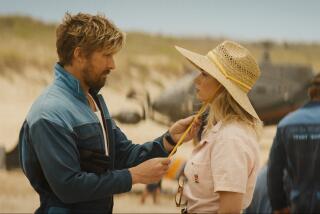The Essential Question
This summer, Salvatore Stabile got on an airplane and flew to Los Angeles for the first time. In his lap he clutched a Hefty garbage bag filled with cans of film. The Hefty bag and Stabile never separated from each other. He was 20 years old, repeating the mythical journey of thousands before him.
The cans contained the movie that Stabile had made on the streets of Brooklyn, N.Y. He was coming to show his movie to “Hollywood” and convince that elusive place to embrace him and accept him as one of their own. More specifically, he was thinking of a nationwide distribution deal, top-flight representation and promises of big money for his next movie, whatever it might be.
Stabile had little idea how he would accomplish these things. He was hardly the product of a high-toned film school. In fact, Stabile was lucky to be on the plane at all and not rotting in some jail. In his teenage years Stabile had lifted more than a few radios from parked cars and spent more than a few evenings in police lineups.
One day in Brooklyn, some toughs from his school caught him and beat him up bad. Maybe it was a girl, maybe something else. The toughs never said why but Stabile took it as a warning and dropped out of school. Within a few months his parents told him to straighten up his life or get out of the house. He got out.
So there he was: a juvenile delinquent, no prospects. What to do? Why, make a movie, of course. In some ways “making a movie” has become the modern equivalent of the old adage, “go West.” It’s the thing to do if you’re young and ambitious and have no prospects at home. It’s the modern way of lighting out for the territories.
The reason is simple enough. In Hollywood, they don’t ask questions about your pedigree. No one cares about a youthful rap sheet back in Brooklyn. In gold-rush San Francisco they didn’t care either. Frontier America and Hollywood share that common outlook. The only question is whether you can deliver the goods.
Try to picture for a moment the banking industry or a bar association considering the application of Sal Stabile. No degree, Sal? Pity. And these encounters with the constabulary. Not good, Sal. The secretary will show you the door, Sal.
Instinctively, Stabile understood his dilemma. He went to live with his grandmother and, after a few twists and turns, he was soon making his movie with $5,000 of grandmom’s donated money.
“At my high school we had this crowd of rich kids who would come to school in BMWs, wearing Armani,” says Stabile. “My group didn’t have that stuff. When we stole things, like the cars and radios, it was our way of getting it. Making a movie was the same thing. A way to get it.”
Perfect. Spoken like Louis B. Mayer or Harry Cohn. But what kind of movie can you make for $5K? Not much unless you use your acquired skills to obtain the film stock free of charge, unless you get the city of New York to contribute the electricity by tapping its lines, unless you make no bothersome payments for actors, permit fees or crews. All of which Stabile managed to do.
Shooting at night on city streets to avoid notice, Stabile fashioned the film out of his own life. It tells the tale of four young lowlifes who accidentally shoot an acquaintance and must dispose of the body. Plans go awry as the night wears on and more bodies accumulate in the trunk of the car.
During one of the first nights of shooting, two policemen drove up and began asking questions. Where were the permits? Why was an electrical chord leading from a street lamp to their equipment?
“I took the cops aside,” says Stabile, “and I said, ‘Come on, don’t bust my balls. This movie, it’s all I got.’ ” It was the appeal of the scrapper, the cry of desperation, and the cops responded. They drove off.
Night after night, the crew kept working. They exhausted themselves, sometimes getting in fistfights with one another. Stabile’s girlfriend would deliver a midnight meal of lasagna, and the crew, lacking plates, would scoop it into their mouths straight from the serving dish.
Finally it was done. The movie, titled “Gravesend,” got shown at a film festival in the Hamptons and attracted the attention of Daniel Edelman, a producer who specializes in lost causes. He scraped together a few more dollars and encouraged Stabile to go West.
So what happened to Salvatore Stabile in Hollywood? You can probably guess by now. Edelman just happened to know Robert Bookman, one of the top agents at Creative Artists Agency. Bookman agreed to see the movie. He even took some other agents and, of course, they loved it.
In fact, says Bookman, “We all went nuts over it. It had raw talent and emotion and a sense of cinema.”
Bookman became Stabile’s agent and soon Stabile found himself talking deals with production companies run by Oliver Stone and Steven Spielberg. After some backing and forthing, Stabile signed with Spielberg. Meanwhile, Bookman worked on the distribution deal for “Gravesend.”
In other words, it all happened. The entire dream, the one-in-a-million shot. And Hollywood has yet to ask Stabile about his rap sheet. Bookman says he knew nothing of Stabile’s past when he agreed to represent him. He had seen the movie, and that was enough.
None of this guarantees that Stabile will, in fact, grow rich and famous in Hollywood. As Bookman points out, many stray paths will present themselves, and Stabile must navigate them all.
But Hollywood has given him the chance. Despite its venality, its preening and arrogance, Hollywood made an offer to Sal Stabile that others would not. And in doing so, it demonstrated why so many others come each year, feeling its power and allure, hoping for what Sal Stabile got, knowing that the only question will be the essential one.
More to Read
Only good movies
Get the Indie Focus newsletter, Mark Olsen's weekly guide to the world of cinema.
You may occasionally receive promotional content from the Los Angeles Times.






